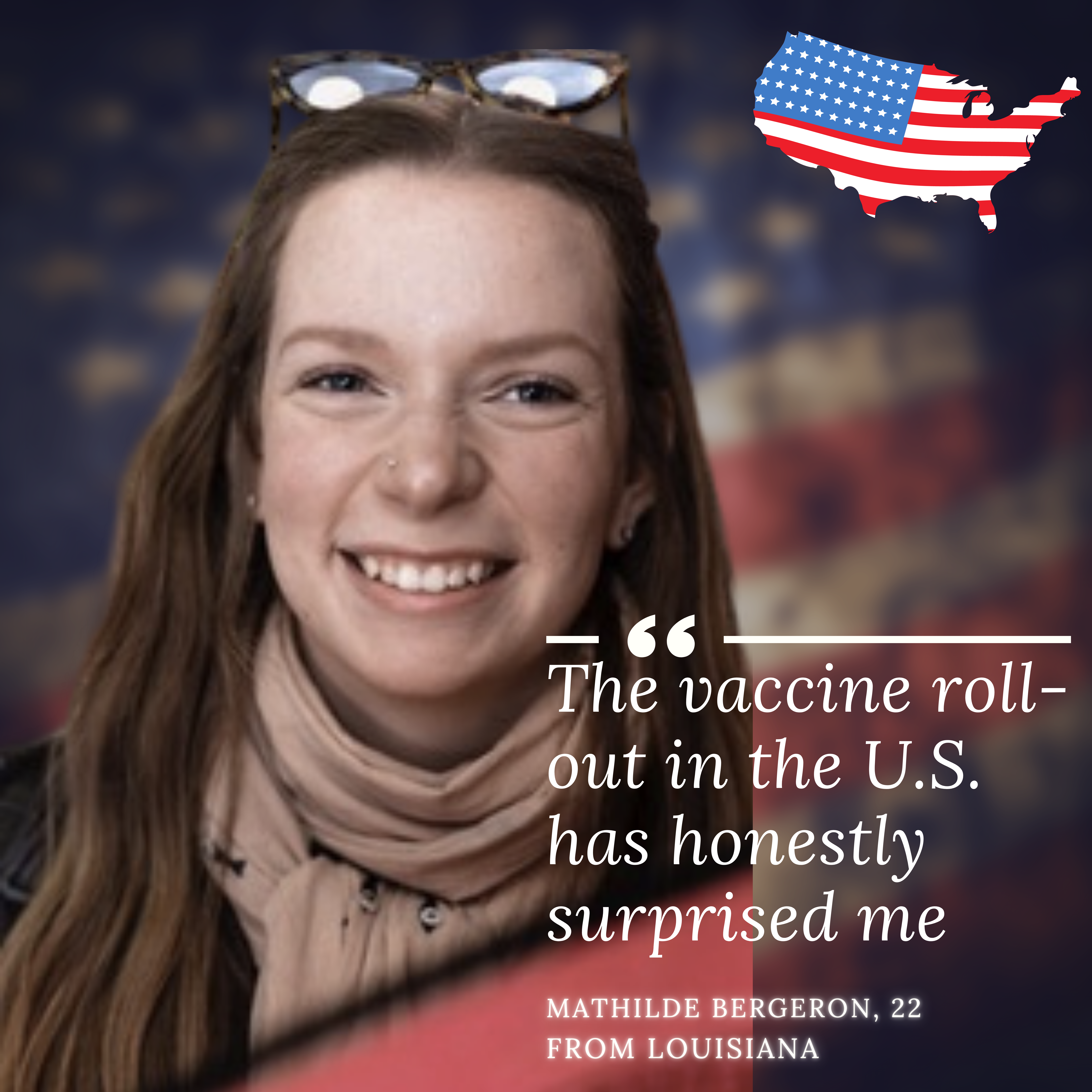Elif Naz Inceol (22) is living in Turkey. In this episode, Naz and I talk about why Turkey left the Istanbul convention this year. This convention protects women’s rights and is a legally binding council of Europe treaty. It covers domestic violence and seeks to end legal impunity for perpetrators. The interview has been conducted at the end of March and produced in May 2021.
Lynn Cheng (36) is living in Taiwan. Here, restaurants and shops are open. Lynn’s life is pretty back to normal: She is currently planning her wedding with over 300 guests.Taiwan has been one of the most successful places in the world dealing with Covid-19. She has never experienced a lockdown and was quite shocked when we talked about the current lockdown in Germany. In this episode of “The Red Telephone”, Lynn and I discuss how Taiwan has managed this crisis. The country has become one of the largest fask mask suppliers in the world.

Mathilde Bergeron (22) is living in the United States, in Louisiana. Mathilde studies her Master’s in Spanish, thanks to one thoughtful professor, an assistantship at the university and a scholarship. Without this help, Mathilde would not be studying in this pandemic.
How is Mathilde experiencing this global crisis in the U.S.? How has the Black Lives Matter movement influenced her view on the world?
Welcome to the podcast project “red telephone”, a title in some ironic-reminiscence to the hotline between Moscow and Washington during the cold war. A format, where I call people around the globe that I have met abroad. With some I have studied, others joined me spontaneously for a few days during traveling, with others I just had a chit-chat for a few minutes in a hostel somewhere in the world. Nevertheless, each of them has an individual, personal story to tell about this last pandemic year. This project wants to give each of them a voice. And as we can’t travel in real life, why not travel via phone calls? This is the podcast red telephone and I am Valérie Nowak, a freelance journalist and honoured to be your host. Grab yourself a tee, relax and sit down with us for a chat.
Rachel Tian (23) lives in Beijing, in China. After earning her Masters degree in Great Britain, Rachel came all the way back to China. Shortly afterwards, a pandemic broke out. How did Rachel experience this pandemic outbreak in China? How much privacy is left when you are tracked wherever you go?
Welcome to the podcast project “red telephone”, a title in some ironic-reminiscence to the hotline between Moscow and Washington during the cold war. A format, where I call people around the globe that I have met abroad. Each of them has an individual, personal story to tell about this last pandemic year. This project wants to give each of them a voice. And as we can’t travel in real life, why not travel via phone calls?
I am Valérie Nowak, a freelance journalist and honoured to be your host. Grab yourself a tee, relax and sit down with us for a chat.
Wie gut erkennst du Gesichter? Super-Recogniser können Gesichter besonders gut wiedererkennen. Selbst, wenn sie die Person vorher nur ein einziges Mal gesehen haben. Diese Talente sind nicht nur für Forscher interessant, sondern auch für die Polizei.
Zu Gast: Josh Davis von der Greenwhich Universität in London. Er sucht nach Super Recognisern für Polizei und Geheimdienste.
Könntest auch du ein Super Recognizer sein? Mach hier den Test: https://www.superrecognisers.com/
Das Smartphone einfach mit dem eigenen Gesicht entsperren: Die automatische Gesichtserkennung ist längst im Alltag angekommen. Aber wann schneidet diese Technik unsere Grundrechte ein? Und wo kann Gesichtserkennung helfen, Verbrecher aufzuspüren? Antworten dazu gibt es in dieser Folge Pioniergeist.
Mit dabei: Josh Davis von der Universität Greenwich, der zu Super-Recognisern forscht. Außerdem mit dabei: Torben Teepe und Martin Knoche, die als wissenschaftliche Mitarbeiter an der Technischen Universität München Algorithmen für Gesichtserkennung entwickeln und verbessern sowie Robert Helling, Mitglied vom Chaos Computer Club München.
Bist du ein Super-Recogniser? Mach hier den Test: bit.ly/2SHCQ4f
Studien (Auswahl): bit.ly/2SGG3kn bit.ly/37IzVMS bit.ly/2V5RLqc
Artikel bei Wired über Woody Bledsoe: bit.ly/2P7gKG0
Die Chirurgie ist immer noch eine Männerdomäne: Auf vier Chirurgen kommt in Deutschland eine Chirurgin. Aber warum entscheiden sich Medizinerinnen gegen die Chirurgie? Genau das will diese Folge Pioniergeist herausfinden. Ronja Zgraja, eine angehende Chirurgin, lässt uns in ihren Joballtag blicken. Christiane Groß vom Deutschen Ärztinnenbund und Frauke Fritze-Büttner vom Berufsverband Chirurgie diskutieren, wo sich die Chirurgie verändern muss.





